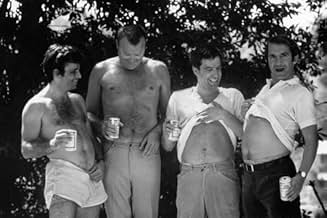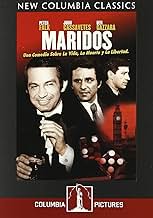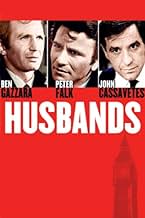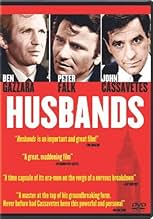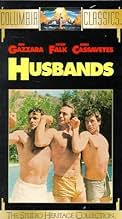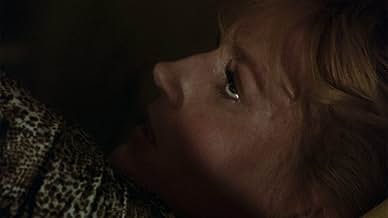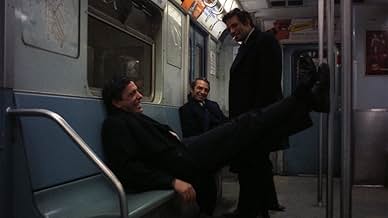Dopo la morte di un amico comune, tre uomini sposati lasciano le loro vite insieme, in cerca di piacere e libertà e alla fine partono per Londra.Dopo la morte di un amico comune, tre uomini sposati lasciano le loro vite insieme, in cerca di piacere e libertà e alla fine partono per Londra.Dopo la morte di un amico comune, tre uomini sposati lasciano le loro vite insieme, in cerca di piacere e libertà e alla fine partono per Londra.
- Regia
- Sceneggiatura
- Star
- Premi
- 1 candidatura in totale
- Annie
- (as Meta Shaw)
- 'Normandy' Singer
- (as Eleanor Gould)
Recensioni in evidenza
This was the first Cassavettes movie I've ever seen. I liked it, which was surprising because this is not the sort of movie I'm generally interested in. There's almost no plot to speak of, most of the movie feels improvised (although improvised along certain set themes -- one does feel the heavy hand of the director here and there). It's a slice of life movie that still feels pretty rough and daring; I imagine in 1970, when this came out, people couldn't make hide nor hare of it.
Like most movies of this type, the big flaw is structure. The movie takes forever to get going, and doesn't really seem to know when to quit: the last reel, in particular, felt a little long to me. Plus, as I said, there is here and there a sense of a structure being imposed from without: the guys don't just do anything, they do certain set things for "character revelation" sake.
The acting, which is the crucial thing in a movie like this, of course, doesn't disappoint. All three men are very believable: they delineate their macho world quite well, with it's romanticism, bathos, insecurities and obnoxiousness. They're similar types of guys, which bothered me a lot at first but upon reflection made a lot of sense, since in real life we tend to be friends with people like us. Still, there are gradations and variations: Falk is inarticulate and sensitive, Gazzara despairing, Cassavettes is fumbling toward some kind of self-recognition.
The cinematography is absolutely stunning -- I might have seen a particularly nice print but this took me by surprise. Most of the movie is shot in warm, earthy, romantic tones, which sets the mood of nostalgia and dreams well, I think. Every now and then, though, we get a cold, full-on daytime shot where everyone looks naked and blinking under a frigid sun; it's a good counterpoint.
This is an important film by an important director. He'll never be a favorite of mine, but I'll definitely check out other work of his. You'll be doing yourself a favor if you do the same.
What I do like about Cassavetes is that he explored in a way few writers/directors at the time did the complexities of male emotions. His male characters don't fall into easy categories and neither do their interior lives. In what he has his characters say and do, it's like he wanted to present the male id on screen visually, in all its obnoxious glory.
But the flip side is that it makes his characters unpleasant and exhausting to be with. I went out with a bunch of guys for a bachelor party once, and one of them was talking loudly about how ugly and fat a girl was sitting at a nearby table in a bar. He clearly wanted her to hear, and it's like he was performing for the rest of us. The other guys, because they didn't want to be accused of ruining the evening I guess, or because they genuinely found it funny, played along and encouraged him. The whole experience was so uncomfortable and toxic that I left shortly after and didn't go on to do the rest of the things planned for the evening.
Watching "Husbands" is like two hours of that experience. It's watching three guys hang out and desperately try to avoid the emotions stirred up by the recent death of a fourth buddy. This means they fight, get maudlin, get drunk, get abusive, treat women like crap. We don't get to know these guys. We're just dumped into the middle of their circle of friendship and sent off with them into the night to hang out for a couple of hours. I can't relate to Cassavetes movies. I'm the same age as the guys in this movie, maybe even a little older than they're supposed to be, with a wife and kids. I don't understand the contempt and anger they show for the world, for their wives, for each other. They don't live in a world that resembles anything I've directly experienced. And since Cassavetes just observes rather than explains, I don't learn anything about it that might help me understand more. I just get claustrophobic and want to leave the party early. Like every other Cassavetes movie I've seen, this one felt more than anything else like an endurance test.
Grade: B
Cassavetes was one of our best and sorely underappreciated by most Americans. A real crime! It may seem long (especially the bar scene), but he didn't make ENTERTAINMENT as he so often said. He cared about people and relationships and their frustrations and disappointments. Don't miss this one!
Lo sapevi?
- QuizScreenwriter John Cassavetes wrote the film's dialogue after doing improvisations with actors Ben Gazzara and Peter Falk. Reportedly, Cassavetes built the film's three main central characterizations around the real-life personalities of the film's three main actors one of whom included himself.
- Citazioni
Archie Black: [Arriving at the funeral] I suppose this is proper, all these big cars and chauffeurs. Black shiny cars. Seems dopey for a guy like that. Well, I guess that's what they do. People get symbolic over death. They get very formal, and it's really ridiculous. Because it's probably the most humiliating thing in the world. But I feel very relaxed. People die of tensions. That's all they die of, Gus. That's the truth. Did you know that? I know it, and it's something I'm never gonna forget.
Gus Demetri: Don't believe truth. Just don't believe truth. Archie, I'm telling you, don't believe truth.
Archie Black: That is the truth now. You see, the truth will never kill you. Lies will. Not cigarettes, not alcohol. Lies, Gus. Lies and tensions. That'll kill you. That'll kill you before cancer in the heart. Did you know that?
- Curiosità sui creditiThere are no closing credits and no "THE END" title card. The screen just goes black. In the opening credits, everyone involved in the film (even the "little people") are credited on two "tell all" title cards, right on down from the actors to the grips, a total of 82 credits.
- Versioni alternativeThe original theatrical release ran 154 minutes. The out-of-print VHS release from Columbia/Tristar runs 132 minutes.
- Colonne sonoreShow Me the Way to Go Home
(1925) (uncredited)
Written by Irving King
Sung a cappella by Ben Gazzara, Peter Falk and John Cassavetes
I più visti
- How long is Husbands?Powered by Alexa
Dettagli
Botteghino
- Budget
- 1.000.000 USD (previsto)
- Lordo in tutto il mondo
- 2735 USD
Contribuisci a questa pagina



